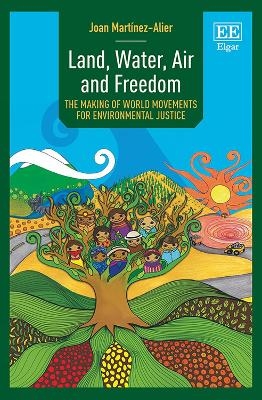
Land, Water, Air and Freedom
Edward Elgar Publishing Ltd (Verlag)
978-1-0353-1276-4 (ISBN)
Each narrative emphasizes the diverse vocabularies, iconographies, and valuation languages of poor and Indigenous activists without losing sight of the global scale of climate action and biodiversity loss. Revealing the circularity gap at the centre of the industrial economy, the book focuses on the frontiers of commodity extraction and waste disposal. Alongside exploring protagonists and geographies of resistance, chapters delve into corporate irresponsibility, unequal trade, and feminist neo-Malthusianism. Although grassroots movements for socio-economic sustainability are deeply diverse, there are global patterns of action and empowerment.
This book will be essential reading for students and scholars of environmental social sciences and humanities, anthropology, geography, international relations, and ecology. It will also help activists engaged in the movements for environmental justice.
Joan Martínez-Alier, Professor of Economics and Economic History, Universitat Autònoma de Barcelona, Spain, recipient of the Balzan Prize in 2020 and the Holberg Prize in 2023
Contents: Preface 1 Introduction: comparative political ecology – the EJAtlas, geographical and thematic perspectives 2 Japan: toxic archipelago 3 The Philippines: extractivism and violence 4 Women environmental defenders killed around the world 5 Taiwan’s environmental movement 6 China: political ecology with Chinese characteristics – limits to eco-compensation (with Dr Juan Liu) 7 The Arctic, a growing commodity extraction frontier, with Ksenija Hanaček 8 India: Odisha, one of the states which are victims of “extractivism” 9 India: Kerala and Tamil Nadu 10 The world anti-nuclear movement since the 1970s 11 Biodiversity conservation: “militarized conservation” vs “convivial conservation” 12 East Africa: Kenya and Tanzania, wildlife and human livelihoods 13 South East Africa: Madagascar and Mozambique; transnationals and BINGOs 14 Nigeria and the Gulf of Guinea: “we thought it was oil but it was blood” 15 Sand mining for metallic minerals: a new commodity frontier, with Arpita Bisht 16 Blockadia and climate justice: LFFU movements 17 The Andean countries and Southern Cone 18 Mesoamerica and the Caribbean: from Zacatecas to Neo Zapatismo 19 Brazil and the Guianas: iron ores, tailings dams and land conflicts 20 Working-class environmentalism 21 Agrarian justice and human ecology 22 Religious groups as environmental activists 23 The Iberian Peninsula: transboundary conflicts 24 The United States: the cradle of environmental justice against environmental racism 25 Indigenous revival and resistance around the world 26 Preciosities vs bulk commodities in ecologically unequal trade 27 Corporate social irresponsibility and systematic lack of environmental liability 28 Environmental activism, uncertain risks and post-normal science 29 Population and resources: feminism and neo-Malthusianism, with Eduard Masjuan 30 Conclusion: is there a global environmental justice movement? References Index
| Erscheinungsdatum | 14.12.2023 |
|---|---|
| Verlagsort | Cheltenham |
| Sprache | englisch |
| Maße | 169 x 244 mm |
| Themenwelt | Naturwissenschaften ► Biologie ► Ökologie / Naturschutz |
| Recht / Steuern ► EU / Internationales Recht | |
| Recht / Steuern ► Öffentliches Recht ► Umweltrecht | |
| Sozialwissenschaften ► Politik / Verwaltung | |
| ISBN-10 | 1-0353-1276-X / 103531276X |
| ISBN-13 | 978-1-0353-1276-4 / 9781035312764 |
| Zustand | Neuware |
| Haben Sie eine Frage zum Produkt? |
aus dem Bereich


